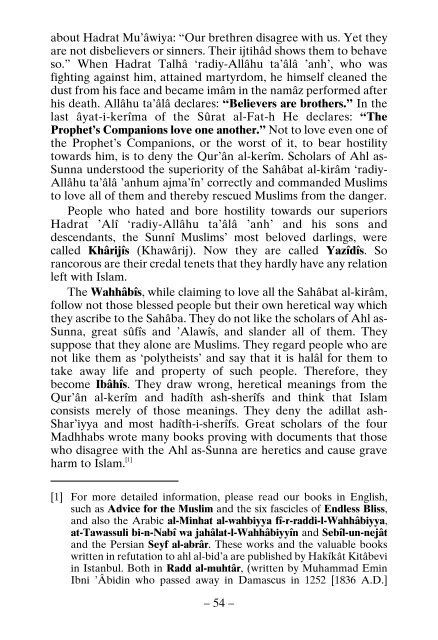Belief and Islam
BELIEF AND ISLAM star This work, Belief and Islam, originally was written in Persian under the title I’tiqâd-nâma by Hadrât Mawlânâ Khâlid al-Baghdâdî, a profound ‘âlim of Islam and a specialist in ma’ârif of tasawwuf. Hâji Faydullah Effendi of Kemah, a khalîfa of great walî Mavlânâ Mahmûd Sâhib, the brother of the author, translated the book into Turkish and named it Farâid-ul-fawâid which was printed in Istanbul in 1312 A.H.[1894]. Our bookstore had it translated again from the Persian original into Turkish and, some explanations and three chapters, published it with the title Imân ve Islâm in 1966. German, French and Arabic versions are also published by our bookstore. This book, explains five fundamentals of Islam, six fundamentals of îmân and the contemporary information about the matter and refutes those who are against Islam and those who are lâ-madbhabî.
BELIEF AND ISLAM
star This work, Belief and Islam, originally was written in Persian under the title I’tiqâd-nâma by Hadrât Mawlânâ Khâlid al-Baghdâdî, a profound ‘âlim of Islam and a specialist in ma’ârif of tasawwuf. Hâji Faydullah Effendi of Kemah, a khalîfa of great walî Mavlânâ Mahmûd Sâhib, the brother of the author, translated the book into Turkish and named it Farâid-ul-fawâid which was printed in Istanbul in 1312 A.H.[1894]. Our bookstore had it translated again from the Persian original into Turkish and, some explanations and three chapters, published it with the title Imân ve Islâm in 1966. German, French and Arabic versions are also published by our bookstore. This book, explains five fundamentals of Islam, six fundamentals of îmân and the contemporary information about the matter and refutes those who are against Islam and those who are lâ-madbhabî.
You also want an ePaper? Increase the reach of your titles
YUMPU automatically turns print PDFs into web optimized ePapers that Google loves.
about Hadrat Mu’âwiya: “Our brethren disagree with us. Yet they<br />
are not disbelievers or sinners. Their ijtihâd shows them to behave<br />
so.” When Hadrat Talhâ ‘radiy-Allâhu ta’âlâ ’anh’, who was<br />
fighting against him, attained martyrdom, he himself cleaned the<br />
dust from his face <strong>and</strong> became imâm in the namâz performed after<br />
his death. Allâhu ta’âlâ declares: “Believers are brothers.” In the<br />
last âyat-i-kerîma of the Sûrat al-Fat-h He declares: “The<br />
Prophet’s Companions love one another.” Not to love even one of<br />
the Prophet’s Companions, or the worst of it, to bear hostility<br />
towards him, is to deny the Qur’ân al-kerîm. Scholars of Ahl as-<br />
Sunna understood the superiority of the Sahâbat al-kirâm ‘radiy-<br />
Allâhu ta’âlâ ’anhum ajma’în’ correctly <strong>and</strong> comm<strong>and</strong>ed Muslims<br />
to love all of them <strong>and</strong> thereby rescued Muslims from the danger.<br />
People who hated <strong>and</strong> bore hostility towards our superiors<br />
Hadrat ’Alî ‘radiy-Allâhu ta’âlâ ’anh’ <strong>and</strong> his sons <strong>and</strong><br />
descendants, the Sunnî Muslims’ most beloved darlings, were<br />
called Khârijîs (Khawârij). Now they are called Yazîdîs. So<br />
rancorous are their credal tenets that they hardly have any relation<br />
left with <strong>Islam</strong>.<br />
The Wahhâbîs, while claiming to love all the Sahâbat al-kirâm,<br />
follow not those blessed people but their own heretical way which<br />
they ascribe to the Sahâba. They do not like the scholars of Ahl as-<br />
Sunna, great sûfîs <strong>and</strong> ’Alawîs, <strong>and</strong> sl<strong>and</strong>er all of them. They<br />
suppose that they alone are Muslims. They regard people who are<br />
not like them as ‘polytheists’ <strong>and</strong> say that it is halâl for them to<br />
take away life <strong>and</strong> property of such people. Therefore, they<br />
become Ibâhîs. They draw wrong, heretical meanings from the<br />
Qur’ân al-kerîm <strong>and</strong> hadîth ash-sherîfs <strong>and</strong> think that <strong>Islam</strong><br />
consists merely of those meanings. They deny the adillat ash-<br />
Shar’iyya <strong>and</strong> most hadîth-i-sherîfs. Great scholars of the four<br />
Madhhabs wrote many books proving with documents that those<br />
who disagree with the Ahl as-Sunna are heretics <strong>and</strong> cause grave<br />
harm to <strong>Islam</strong>. [1] – 54 –<br />
[1] For more detailed information, please read our books in English,<br />
such as Advice for the Muslim <strong>and</strong> the six fascicles of Endless Bliss,<br />
<strong>and</strong> also the Arabic al-Minhat al-wahbiyya fî-r-raddi-l-Wahhâbiyya,<br />
at-Tawassuli bi-n-Nabî wa jahâlat-l-Wahhâbiyyîn <strong>and</strong> Sebîl-un-nejât<br />
<strong>and</strong> the Persian Seyf al-abrâr. These works <strong>and</strong> the valuable books<br />
written in refutation to ahl al-bid’a are published by Hakîkât Kitâbevi<br />
in Istanbul. Both in Radd al-muhtâr, (written by Muhammad Emin<br />
Ibni ’Âbidin who passed away in Damascus in 1252 [1836 A.D.]

















